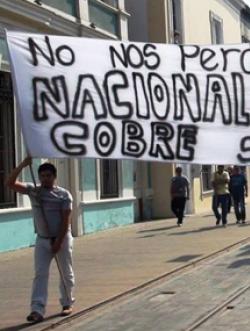From mid-May to the end of August, I visited several mines in Chile and Peru. Through the assistance of the Chilean Copper Workers Confederation (CTC, Confederación de Trabajadores del Cobre) and the Peruvian Mining Federation (FMP, Federación Minera del Perú), I explored the demands and struggles of mineworkers in these two Latin American countries. Chile and Peru are Latin America’s largest mining producing countries, and my fieldwork, supported by ILR’s International Travel Grant Award, was quite helpful for the development of my dissertation proposal.
Although I had been to Chile before, this was the first time I went to the northern part of the country. On May16th, when I arrived in Iquique for the first time, a strike organized by local dockworkers and miners occurred. This gave me the chance to speak with several mineworkers about their main demands and to observe the strategies they used to mobilize both locally and nationally. Although I had made formal contacts with the CTC before my arrival, introducing myself "in the field" made it easier for me to learn about different workers’ organizations and to talk to several rank-and-file groups, which was crucial to gain deep access to the miners’ culture. This would have been impossible without me being there, explaining my research interests and personal goals face to face. Over time, my knowledge about the challenges experienced by labor in Latin America improved, as I not only listened to the leaders’ perspectives, but also to the people that experience poor working conditions on a daily basis.
In addition to this, I visited both local archives and universities in Iquique and Antofagasta. I started researching about the history of the Northern miners’ mobilizations in early June, which was a great setting to write their organizations’ trajectories, which will be valuable for my research and for these organizations’ identities. To do this, I visited public libraries’ and private newspapers’ archives, obtaining rich information on local dynamics, not available otherwise. After working on short memos in Spanish, I passed them along to some workers in order to improve them with their comments. Additionally, I visited the Universidad Arturo Pratt, in Iquique, and the Universidad Catolica del Norte, in Antofagasta, where I spoke with scholars interested in the mining industry. Dr. Sandra Leiva and some of her undergrad students told me about their active research community, focused on the politics of labor in Iquique. In Antofagasta, Dr. Miguel Atienza, who leads a team focused on economic development in the country’s mining regions, explained to me the research streams on mining and local development used in Chile. These conversations, as well as others with local activists, were fruitful to re-frame my research.

Although I originally planned to stay for 3 months exclusively in the Chilean North, I had to go back to Santiago, Chile’s capital, for one week in August and later to Peru because there were unpredicted, but interesting developments crucial for my research project. On the one hand, I went to Santiago because the CTC decided to go on a national strike after Codelco, the state mining company, decided not to improve subcontracted workers’ salaries this year. While I was originally interested in the regional dynamics of labor, I soon learned that I needed to go to Santiago in order to understand how local and national dynamics intertwined. In Santiago, I was able to talk to some of the most important and experienced leaders of the CTC.
On the other hand, as one of the unions I have been studying in Peru for the last two years began its collective bargaining in July, in late August, I went to Lima to talk with leaders from different unions about their organizations' current and future strategies. After interviewing several leaders and some company managers, I visited the Universidad Catolica del Peru, where faculty members of the Sociology program asked me to present my research. This was valuable because, as in Chile, I got feedback from Peruvian colleagues about my project’s methods and theoretical framework. Personally, I am sure this will make my research not only academically rigorous, but also meaningful for the Latin American public.
In summary, I consider this to be a very productive summer in terms of academic and personal experiences. Although my initial plans changed a little while I was in the field, this variation permitted me to obtain a broader view of the mineworkers’ dynamics, and the opportunity to be at different sites helped me to write a richer and more complete dissertation proposal. All of this would not have been possible without the support from ILR, because ILR's support got me access to places that would have been otherwise impossible, and this was crucial to discuss my ideas with workers, managers, activists and academics in very engaging ways. Finally, I find my research more socially committed now than it was before the summer. I’m truly grateful to the ILR School for such a wonderful opportunity.





